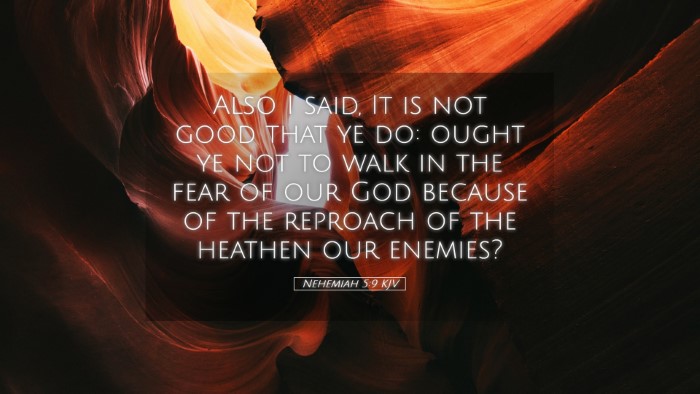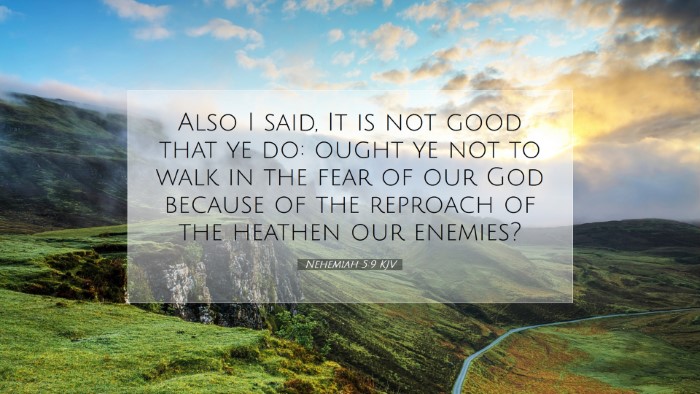Old Testament
Genesis Exodus Leviticus Numbers Deuteronomy Joshua Judges Ruth 1 Samuel 2 Samuel 1 Kings 2 Kings 1 Chronicles 2 Chronicles Ezra Nehemiah Esther Job Psalms Proverbs Ecclesiastes Song of Solomon Isaiah Jeremiah Lamentations Ezekiel Daniel Hosea Joel Amos Obadiah Jonah Micah Nahum Habakkuk Zephaniah Haggai Zechariah MalachiNehemiah 5:9
Nehemiah 5:9 KJV
Also I said, It is not good that ye do: ought ye not to walk in the fear of our God because of the reproach of the heathen our enemies?
Nehemiah 5:9 Bible Commentary
Commentary on Nehemiah 5:9
Nehemiah 5:9 (ESV): "So I said, 'The thing that you are doing is not good. Ought you not to walk in the fear of our God to prevent the taunts of the nations our enemies?'
Contextual Background
The book of Nehemiah chronicles the return of the Jewish exiles to Jerusalem and the rebuilding of the city's wall. Chapter 5 reveals internal strife among the Jewish people, highlighting the injustices faced by the poor. Nehemiah, upon learning of these grievances, stands up for justice and unity among God's people.
Exegesis of Nehemiah 5:9
Nehemiah addresses the nobles and officials who are exploiting their fellow countrymen. He emphasizes that their actions are not only unjust but also detrimental to their collective mission under God. Matthew Henry comments on how "the rulers are called to account for their disobedience against God's commands and the need for humility among the leaders." Nehemiah's concern is not only for justice but also for the reputation of God among the nations.
Insights from Commentaries
-
Matthew Henry:
Henry notes that Nehemiah was concerned about the fear of God being made evident in their community. He posits: "They were sinners already, and had to struggle with their own sinful nature; yet, they still needed to maintain their integrity before God." This aligns the ethical challenges of the community with their spiritual obligations.
-
Albert Barnes:
Barnes points out that Nehemiah’s rebuke served as both a correction and a call to repentance. He asserts, "The fear of God is the foundation of all righteousness, and without it, their actions would lead to humiliation among the nations." The fear of God incentivizes ethical living among God's people, reinforcing the social fabric of their community.
-
Adam Clarke:
Clarke emphasizes the moral duty of the Israelites to uphold fairness and compassion. He states that "the wealthy should not take advantage of the poor, especially in times of distress." His commentary suggests that Nehemiah's appeal is a reaffirmation of social justice as an integral aspect of their covenantal relationship with God.
Theological Reflections
Nehemiah’s exhortation reminds leaders and believers alike about their social responsibilities. The church today can draw parallels between Nehemiah's message and contemporary issues of social justice. This exhortation serves as a clarion call against exploitation and towards solidarity, underscoring the unity required among believers.
The Fear of God
The concept of the "fear of God" in biblical literature is multifaceted, encompassing awe, respect, and reverence. Nehemiah's appeal indicates that proper fear of God should lead to ethical behavior and promote harmony within communities. As noted in commentaries, a genuine encounter with God transforms the believer's conduct and attitude towards others.
Implications for Church Leadership
-
Accountability:
Leaders are called to be examples of righteousness. Nehemiah demonstrates the necessity of confronting sinful behavior and seeking to establish justice.
-
Mission Integrity:
Leaders' actions reflect on God’s character and mission. As Nehemiah indicates, poor treatment of others can lead to detrimental consequences for the community's public witness.
-
Compassion:
The call to love one’s neighbor is central to following God's commands. Church leadership must embody this principle, just as Nehemiah championed the needs of the vulnerable.
Conclusion
Nehemiah 5:9 serves as a pivotal reminder of the ethical demands placed upon God's people. In a world filled with injustice and exploitation, the church is called to reflect God's character through action. Thus, Nehemiah's words resonate profoundly within the contemporary church context, urging us all to walk in the fear of God and to uphold justice among one another for the greater witness to the world.


